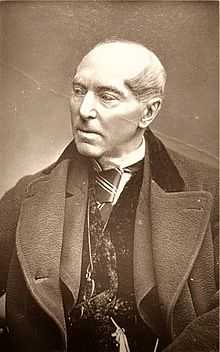Charles James Mathews

Charles James Mathews (26 December 1803 – 24 June 1878) was a British actor. He was one of the few British actors to be successful in French-speaking roles in France. A son of the actor Charles Mathews, he achieved a greater reputation than his father in the same profession and also excelled at light comedy. He toured three times in the United States, and met and married his second wife there.
Biography
Charles James Mathews was born in Liverpool. After attending Merchant Taylors' School, Crosby, he was articled as the architect Augustus Charles Pugin's apprentice. For some years, Mathews worked at this profession.
His first public appearance on the stage was made on 7 December 1835, at the Olympic Theatre in London, as George Rattleton in his own play The Humpbacked Lover, and as Tim Topple the Tiger in Leman Rode's Old and Young Stager.
Marriage and family
In 1838, he married Madame Vestris, then lessee of the Olympic, as her second husband.[1] That year he also toured the U.S., to lukewarm reviews. In 1856, Mme Vestris died.
The following year Mathews again visited the U.S., and there in 1858 he married Mrs A. H. Davenport, whose son Charles Willie West assumed his stepfather's surname by deed poll.[2]
Career
Mathews started managing the Olympic Theatre soon after his marriage to Mme Vestris, but did not succeed financially. Despite introducing innovations of more realistic and detailed scenery, his following management of the Theatre Royal, Covent Garden, and the Lyceum Theatre also had limited financial return. They did have quite a success with their production of the Victorian farce London Assurance (1841), commissioned for their company and written by Dion Boucicault. This was Boucicault's first major success.
London Assurance has continued to have revival productions to great success in both London and New York. Most recently it played to sellout crowds at the Royal National Theatre in the spring of 2010. The production starred Fiona Shaw and Simon Russell Beale. It was broadcast internationally by simulcast in the NTLive! series.
As an actor in England, Mathews held an unrivalled place in his unique vein of light eccentric comedy. He had an easy grace combined with "imperturbable solemnity", a combination which amused people; his humour was never broad, but always measured and restrained. It was as the leading character in such plays as the Game of Speculation, My Awful Dad, Cool as a Cucumber, Patter versus Clatter, and Little Toddlekins, that he especially excelled.
After Mathews' return to England with his second wife, in 1861, they gave a series of "At Home" tabletop reviews at the Haymarket Theatre. These were nearly as popular as those of his father had been.
Charles James Mathews was one of the few English actors who successfully played French-speaking roles. In 1863 he appeared in Paris in a French version of his play Cool as a Cucumber, and was received with praise. He played there again in 1865 as Sir Charles Coldcream in the original play L'Homme blasé (English version by Boucicault was known as Used Up.)
At age 66 in 1869, Mathews set out on a tour round the world, including a third visit to the U.S. He made his last appearance in New York at Wallack's Theatre on 7 June 1872, in H. J. Byron's Not such a Fool as He Looks.
After his return to England in 1872, he continued to act until within a few weeks of his death. His last appearance in London was at the Opéra Comique on 2 June 1877, in The Liar and The Cosy Couple. At Stalybridge he gave his last performance on 8 June 1878, when he played Adonis Evergreen in his comedy My Awful Dad.
Mathews died June 24, 1878.
References
- Sources consulted
-
 This article incorporates text from a publication now in the public domain: Chisholm, Hugh, ed. (1911). Encyclopædia Britannica (11th ed.). Cambridge University Press
This article incorporates text from a publication now in the public domain: Chisholm, Hugh, ed. (1911). Encyclopædia Britannica (11th ed.). Cambridge University Press - Dickens, Charles, Jr., ed. (1879). The Life of Charles James Mathews (2 vols.). London: Macmillan & Co.
- Hutton, Laurence; Matthews, Brander (1886). "HG Paine". Actors and Actresses of the United States and Great Britain (5 vols.). New York: Cassell & Co.
- Timperley, Charles Henry A Dictionary of Printers and Printing, 1842
- Endnotes
- ↑ George A. Riddell (1925). More things that matter. Essay index reprint series (reprint ed.). Ayer Publishing. p. 158. ISBN 0-8369-1843-6.
- ↑ Lentin, A. (2004). "Mathews , Sir Charles Willie, baronet (1850–1920)", Oxford Dictionary of National Biography, Oxford University Press. Accessed 15 July 2008. (Subscription required)
External links
| Wikimedia Commons has media related to Charles James Mathews. |
|